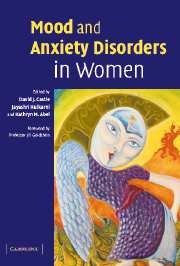Book contents
- Frontmatter
- Contents
- Contributors
- Preface
- Foreword
- 1 Pubertal development and the emergence of the gender gap in mood disorders: A developmental and evolutionary synthesis
- 2 Borderline personality disorder: Sex differences
- 3 Substance use and abuse in women
- 4 Anxiety disorders in women
- 5 Posttraumatic stress disorder in women
- 6 Domestic violence and its impact on mood disorder in women: Implications for mental health workers
- 7 Depression in women: Hormonal influences
- 8 Anxiety and mood disorders in pregnancy and the postpartum period
- 9 Pharmacological treatment of anxiety and depression in pregnancy and lactation
- 10 Bipolar affective disorder: Special issues for women
- 11 Mood and menopause
- 12 Anxiety and depression in women in old age
- Index
12 - Anxiety and depression in women in old age
Published online by Cambridge University Press: 13 August 2009
- Frontmatter
- Contents
- Contributors
- Preface
- Foreword
- 1 Pubertal development and the emergence of the gender gap in mood disorders: A developmental and evolutionary synthesis
- 2 Borderline personality disorder: Sex differences
- 3 Substance use and abuse in women
- 4 Anxiety disorders in women
- 5 Posttraumatic stress disorder in women
- 6 Domestic violence and its impact on mood disorder in women: Implications for mental health workers
- 7 Depression in women: Hormonal influences
- 8 Anxiety and mood disorders in pregnancy and the postpartum period
- 9 Pharmacological treatment of anxiety and depression in pregnancy and lactation
- 10 Bipolar affective disorder: Special issues for women
- 11 Mood and menopause
- 12 Anxiety and depression in women in old age
- Index
Summary
One is not born a woman: one becomes one.
Simone de Beauvoir, Le Deuxieme Sexe (1949)Gender, age, ethnicity and class are major dimensions of social inequality in human societies. Mental illness adds to this inequality and to stigmatisation. Gender and age, although with roots in biology, are both understood within a social context. Women in later life may be seen as compounded of the negative myths which surround the feminine sex and old age.
In classical mythology the three Fates were conceived of as old women at a spinning wheel determining men's lifespans and destinies. Clotho draws out the thread of life, Lachesis measures it out and Atropos cuts it off. This duality of women, the weaker sex but with a dark and powerful side is evident in religions, pseudoscience, art and literature. Old age similarly attracts fables which emerge from and influence deeply ingrained fears and attitudes. Old age rarely attracts positive epithets, usually it is denigratory or patronising – grumpy old; boring old; sweet old............ We praise old people not for ageing well but for seeming younger than their years.
This negative perception is reflected in the way older people view themselves. Ageing is a wound to one's narcissism and self-esteem. To counteract it, it is possible to enumerate many who have overcome the barriers and handicaps of age, but an idealisation of a few biographies (Garner & Ardern, 1998) does not adequately redress the balance in a culture where most would fail by comparison with the youth centred norm.
- Type
- Chapter
- Information
- Mood and Anxiety Disorders in Women , pp. 242 - 266Publisher: Cambridge University PressPrint publication year: 2006



